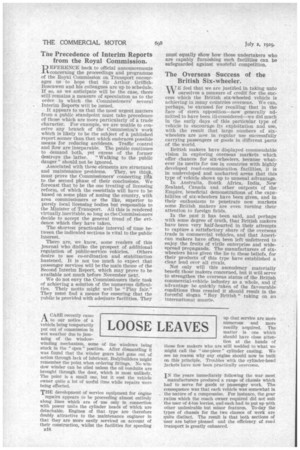The Precedence of Interim Reports from the Royal Commission.
Page 44

If you've noticed an error in this article please click here to report it so we can fix it.
lop EFERENCE back to official announcements liiconcerning the proceedings and programme of the Royal Commission on Transport encourages us to hope that Sir Arthur GriffithBoscawen and his colleagues are up to schedule. If so, as we anticipate will be the case, there still remains a measure of speculation as to the order in which the Commissioners' several Interim Reports will be issued.
It appears to us that the most urgent matters from a public standpoint must take precedence of those which are more particularly of a trade character. For example, we are unable to conceive any branch of the Commission's work which is likely to be the subject of a published report sooner than that which embraces possible means for reducing accidents. Traffic control and flow are inseparable. The public continues to demand both, yet excess of the former destroys the latter. "Walking to the public danger" should not be ignored.
Associated with these elements are structural and maintenance problems. They, we think, must prove the Commissioners' connecting Hall to the second phase of their conclusions. We forecast that to be the one treating of licensing reform, of which the essentials will have to be based on some plan of zoning the country, with area commissioners or the like, superior to purely local licensing bodies but responsible to the Minister of Transport. All this is rendered virtually, inevitable, so long as the Commissioners decide to accept the general trend of the evidence which they have taken.
The shortest practicable interval of time between the indicated sections is vital to the public
Interest.
There are, we know, some readers of this journal who dislike the prospect of additional regulation of public-service vehicles. Others desire to see co-ordination and stabilization hastened. It is not too much to expect that passenger services will be the main theme of the Second Interim Report, which may prove to be available not much before November next.
We do not envy the Commissioners their task of achieving a solution of the numerous difficulties. Their motto might well be "Play fair." They must find a means for ensuring that the public is provided with adequate facilities. They
must equally show how those undertakers who are capably furnishing such facilities can be safeguarded against wasteful competition.




















































































































